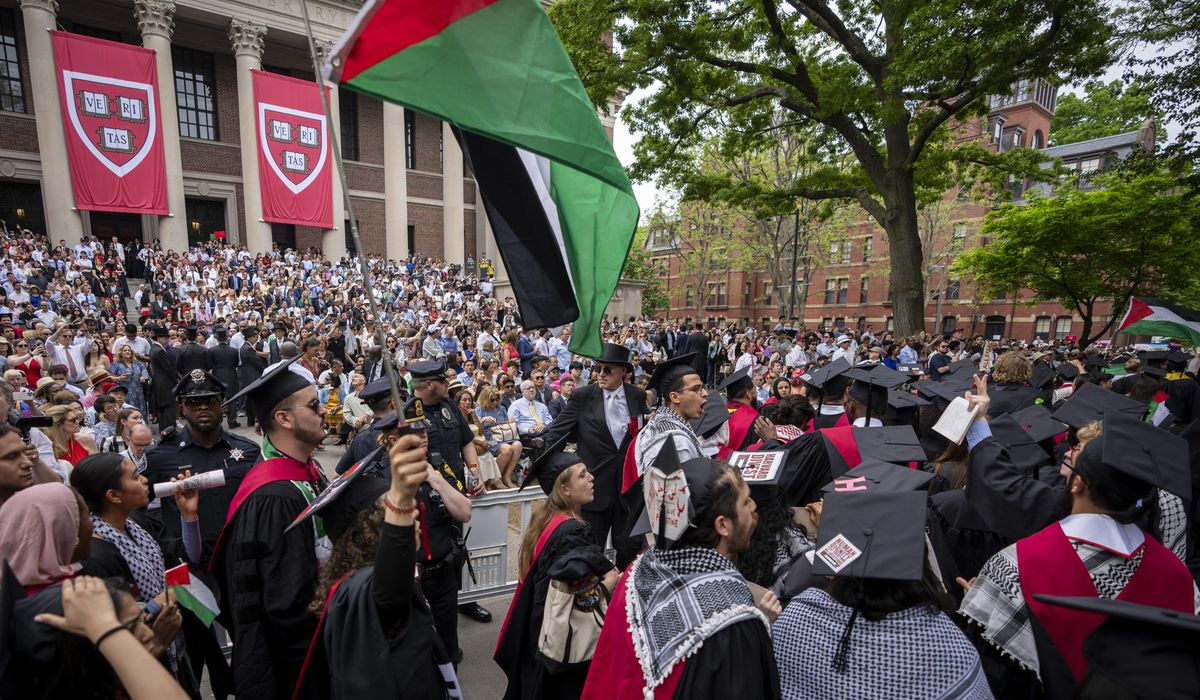


A former Harvard graduate student who was roughed up during an anti-Israel protest has filed an antisemitism lawsuit against the university, accusing school officials of taking no action to punish his alleged attackers and even bestowing honors on two of them.
Yoav Segev, a recent graduate of Harvard Business School, said in his federal complaint that Harvard authorities failed to protect him or discipline anyone in the campus mob that descended on him at a pro-Palestinian demonstration on Oct. 18, 2023, on a campus quad outside Klarman Hall.
“This malicious, violent, and antisemitic conduct violated several University policies — such as its anti-discrimination and anti-bullying policies — and it prompted criminal charges against two of the student-employees who incited the attack,” said the complaint filed Thursday in federal court in Massachusetts. “Nonetheless, Harvard refused to take any reasonable action to punish the assailants or to redress the victim, Mr. Segev.”
The attack drew national attention after a video showing protesters menacing Mr. Segev went viral, helping spur a House Education and the Workforce Committee hearing on campus antisemitism that led to the January 2024 resignation of Harvard President Claudine Gay after just six months in office.
Mr. Segev, who is Jewish and has dual American-Israeli citizenship, was wearing a blue bracelet signaling his support for Israel when he encountered the demonstrators. He and several other students began filming the protest on their phones as an NBC-TV helicopter recorded it overhead.
Even so, demonstrators designed by the protesters as “safety marshals” zeroed in on Mr. Segev, telling him to “get out” and pushing him away. He told them, “Please don’t touch me,” and “please don’t grab me,” said the 129-page lawsuit filed by attorneys from the Holtzman Vogel Baran Torchinsky & Josefiak law firm.
“Even as Mr. Segev attempted to walk by, however, the mob of students continued to surround him, press up against him, and shove protest signs and keffiyehs in his face,” the complaint said. “The crowd then began yelling chaotically in his face, ’Shame! Shame! Shame!’ Fearful for his safety, Mr. Segev tried to escape and was finally able to move past the protestors.”
Later, some students accused Mr. Segev of being the aggressor, while several faculty and staff issued a statement saying that his presence made the protesters feel “unsafe.”
“The faculty and staff called for the assaulters’ protection because of their ’dark skin,’ notwithstanding that they mobbed and assaulted another student,” the complaint said.
Ms. Gay announced later that Harvard would address the incident after the FBI and Harvard University Police Department had completed their investigation. In January 2024, however, the university told Mr. Segev’s attorneys that it had begun an “independent review.”
In May 2024, the Suffolk County District Attorney filed assault and battery charges against two of the alleged assailants, Harvard Law School student Ibrahim Bharmal and Harvard Divinity School student Elom Tettey-Tamaklo.
Both pleaded not guilty. Prosecutors said that the Harvard police “essentially refused to investigate” and that the university had been uncooperative, despite Mr. Segev being an “entirely innocent victim.”
Neither defendant was banned from campus. In April 2025, the judge ordered both students to perform 80 hours of community service and undergo eight hours of anger management, but both were allowed to graduate the following month.
What’s more, Mr. Tettey-Tamaklo was given the honorary role of class marshal at the HDS graduation. Mr. Bharmal was awarded a $65,000 paid public interest fellowship by the Harvard Law Review to work with the Council on American-Islamic Relations.
After repeated requests about the investigation’s status, Mr. Segev was told in May 2025 that student disciplinary proceedings were “confidential” and that the Harvard Law Review is a “legally independent corporate entity.”
“In sum, after dismissing Mr. Segev’s concerns for his own privacy and safety following repeated antisemitic abuse, Harvard refused to provide Mr. Segev any update on the status of the investigation into his attack — a full nineteen months after the attack occurred,” the lawsuit said.
“To date, the only known repercussion for either is that Mr. Tettey-Tamaklo lost his proctor privileges,” said the complaint. “The entire ordeal suggests that one may attack Jews at Harvard with impunity and face no meaningful discipline.”
The Washington Times has reached out to Harvard for comment.
Harvard and the Trump administration have tangled for months over the university’s handling of campus antisemitism, with the university suing in April after the administration said it would freeze billions in federal funding.
• Valerie Richardson can be reached at vrichardson@washingtontimes.com.
